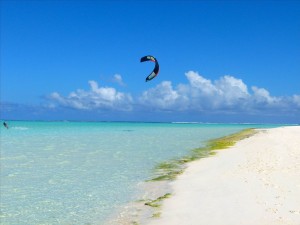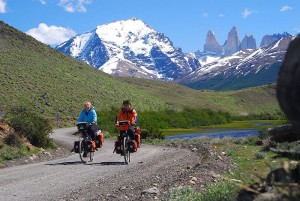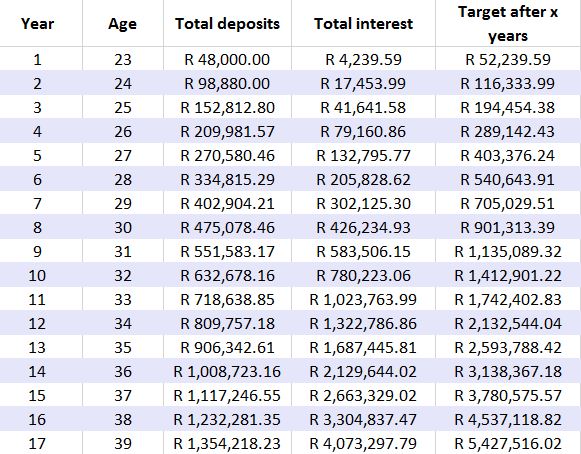It all comes down to how much money you need. If you can live on R178 500 a year, or R14 875 a month, then it’s easy. Need more than that? Well if you’re married, you can double that, and more than likely not double your costs. You should hopefully be sharing a room with your spouse, and even if you’re a massive snorer, renting a two bedroom house is still way cheaper than renting two one bedroom houses. Also you can most likely survive with one car post retirement. With all your new free time it would be a good time to start getting around by bicycle. That will also mean you’ll spend far less on health related items. Could you and your significant other live together on R357 000 a year or R29 750 a month? Well you should be able to, after all that’s far more than most South African households live on…
So why did I pick those numbers? Well, R178 500 means that you’re taking home R158 990 rand a year, and that’s a number I quite like, because if you structure your investments well, it will mean you can earn that while paying practically no tax and therefore you’re not funding Nkaaaahhndla. In addition to that, I believe it’s also a reasonable amount of money to live on if you’re a single bloke, and if you’re a couple, living on double that, R311 124 tax free should be even more of a piece of cake, the whole cake in fact, with a side of fries.
So how does this work? Well, in this example, we’re not going to be putting any money into an RA. Heresy I hear, didn’t I just tell you a little while ago that it’s one of the best ways to screw the tax man? Yes, I did, but an RA is controlled by the government, and set up so it can look after you at regular retirement age. There are huge gobs of penalties you have to pay if you want to withdraw that before you’re 55. We’re looking here at early retirement, so that just won’t do for us.
So, this is what we can do, before raising the alarm bells at SARS:
- You can earn R73 650 in income before you need to pay any income tax (28 Feb 2016 figures).
- You can earn R30 000 in capital gains tax before you need to add that to income.
- You can invest R500 000 plus compounding growth into a tax free account, and anything you earn on it will be exempt from tax.
Those are the three vehicles to get our income, now we need to make use of them. In the calculations I’ll assume that all the numbers above will increase to counter for inflation along the way.
1) Since we won’t be working post retirement (and don’t try to have a side gig because I will call the retirement police :P), we will start our income on a big fat 0. That means that we can have an investment here that is classed as income. For this purpose look at property. Now if you’re smart enough to find a great rental at way below market value, and wise enough to manage it to keep the costs lower than average then you can go for a very high risk, most likely low reward single residential rental property. I’m not that smart. I’ve lost to the market in rental property, and even lost money overall in my last (ever!) house. What I rather recommend we do is to look into listed property. That way you can spread the risk around countless commercial properties, and have a team of experts managing them for you. As always, I suck at picking shares, as do the world’s best share experts, so we’ll have to buy a property index. As with all other things financial, you need to watch the fees, so the cheapest property index to hold is the Stanlib SA property ETF at just 0.35% p/a. Now in the coming year it’ll probably get around about a 6% dividend yield, so we’ll need R1 225 500 worth of those. And as the dividends on a property company aren’t really classed as dividends, but rather as income. That’s R73 650 in the bag, and should increase by at least inflation. Yay us!
2) The next tranche of income for us is the R30 000 exemption before capital gains tax applies. Now obviously we don’t want to hang our heads down in shame while trying to tell our former bosses to un****off, so we want to be able to sell R30k every year, and never run out of money. Luckily we know that the 4% rule is pretty foolproof, so all we need to do here is collect R750 000 in high growth, low dividend shares. Again, the ETF only rule applies, and here we can go with one that has destroyed practically every fund manager around in performance since it was launched, the Satrix Indi. This is in general a high growth, low dividend index, so it’ll meet these needs perfectly, not to mention the fact that it’s averaged 21% per year since inception. Another R30 000 in the till, katching!
3) I’ve loved the fact that the government has given us these magical tax free savings accounts, and while I wish we would be allowed to put more money in them, we’ll have to stick to the R500 000 lifetime limit. So what we’d like to do is grow this fund with something that pays healthy dividends, while at the same time has a good growth record. I’ve recently begun collecting the Dividend Aristocrats ETF. This ETF is still fairly new, but has been a close competitor to the Satrix indi since being launched, while paying out a healthy 3-3.5% in dividends. Putting R2500 a month of these into a tax free savings account and getting the JSE average return of 16.7% p/a from when you start working should mean that you’ll have R1.26 million in todays money in that account all working away for you happily and tax free after +- 17 years. That’ll bring in a dividend income of R44090.
4) Why is there a 4? There were only three points above? If you noticed, those three numbers don’t add up to the magical R158 990. We’re about R9 562 short. To get there, we’re going to use R11 250 that comes in the form of taxable dividends sob sob. You see even though we tried to eliminate tax, the Indi does still pay out dividends, and at around 1.5% that means every year our R750 000 worth of it will give us R11 250 in dividends. And of that R11 250, we’ll have to hand over 15%, or R1687.50 to the government. We can only hope it’s not still run by a corrupt and inept leader in 17 years time. That should leave us with R9 562 in after tax income.
All of those added together brings our total after tax income to R158 990 per year, which is the equivalent of earning R178 500 a year in salary.
Now to get to that point we’ll give ourselves 17 years, after all that will mean you spotty faced teens currently reading this will be able to finish university, and only need to start contributing at age 22 to retire before 40. Ideally though you’ll be more like the model than the doctor, and start investing immediately to take full advantage of the power of compounding, but it’s not necessary in this case. Let’s assume you’ve just started your career, and you’re not yet a big earner. You MUST put R2500 a month away into your tax free savings account. I don’t care how you do it. Live at home with the folks, wait tables in the evenings, eat baked beans and two minute noodles if needed, but make sure that every month R2500 goes into your tax free savings account. There’s no way to catch up on this in future even if you earn a fortune a few years down the line, so we’ll make this the mandatory investment. That leaves us with the R1 225 500 for the property index plus R750 000 in our taxable accounts for a total of R1 975 500 we need to raise.
Amazingly, this works out to just R4000 a month getting JSE average returns, on top of the R2500 that’s going to your tax free savings. Now for someone established in their career this should be a no brainer, but it may be harder for someone starting out. That’s why I used the calculator on site to plot a target which you need to stay ahead of to make this a possibility. That way if you’re new in your career and fall behind, you can make it up later on when your pay has increased.
This table is for people starting work now, for those of us already in our late twenties, early thirties or advanced geriatrics, you’ll get another table later. So youngster, all you need to do is make sure you stay ahead of the “Target after x years” column. If you’re behind in a year, just save harder the next or make it up when you get increases. It’s inflation adjusted too, so you can print this out and stick it somewhere are a reminder and compare as the years go by. Even though the number in the last column looks huge, remember that’s not what you need to put in. The total deposits column is your contribution over a 17 year period, the rest is all compound interest. As you can see, compound interest will add three times as much as you do over 17 years. It’s like free money!
If you’re older, and haven’t had 17 years to contribute to a tax free account don’t worry. I’ve done the maths and worked out where you’d need to be today if you want to retire by 40. The first rule, like with the youngsters, is that you MUST put R2500 into your tax free account every month from now. The rest of the income, including the taxes you’d have to pay are all calculated and added into your taxable account. So just make sure you’re ahead of the “Where you should be today for your age” column, and add R2500 a month to your TFSA account, and R4000 into your taxable account and you’re good to go. If you’re behind and you’d still like to end at 40, you’ll have to work a little harder and/or spend a little less.
So, if you’re an old geezer of 36 like myself, you need to have R2 385 801.74 in investment accounts (excluding your tax free and retirement annuity accounts). You can also look at the table another way, and compare your investment worth to the column on the right to see how many years you’d have to work. So if for example you are 42 and have R1.5 million invested, you would need to invest (R2500 + R4000) R6500 for another 6 or 7 years.
Now on to an aside. If you want to spend more money while not working, you can do that in a few easy ways, while keeping the tax very low. The first option is to buy the house you’d like to live in. Now I don’t mean the three million Rand McMansion you have in Jo’burg, after all why should you have to live with masses of traffic, pollution and concrete when you can live in a very cute little house in one of my favourite places Bulwer for just R450k, and I’m betting you could negotiate it for far less than that. It might need a little work, but you’ve got the time for that! That leaves you able to spend whatever you would have on rent on other things. I’m sure there are many options at around R500k like that in all the cute little towns of South Africa, if you’re willing to live in a prefabricated home, you can even stay in a holiday resort in Scottburgh for under R200k. I’m personally planning on going location free, either in a little yacht so I can float around and explore the best islands that are currently too hard to get to, or too expensive to rent in, or otherwise I’ll just strap a few bags to a bicycle and see where the road takes me.
If you need even more money, then you might just need to pay a little more tax. My advice would be to increase the R750k you have in your taxable account rather than the R1.2m in your income based account, as capital gains is only taxed at one third of income. To give yourself a R5 000 a month raise you need to put an extra R1.5m into that account. Tough, but very possible. The bonus is that your monthly tax bill will only go up by R290 as you’re now just in the lowest tax bracket. If you’re married, your tax will only go up by R145 if you balance the account well!
*Thanks to Mr_Dividend for the great post idea. As he also correctly pointed out, this will only help you avoid income tax. You’ll still need to pay any other taxes such as VAT, the fuel levy, those damn e-tolls etc.



